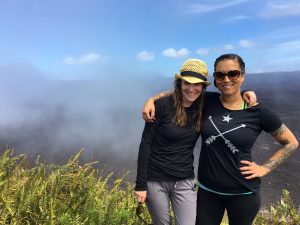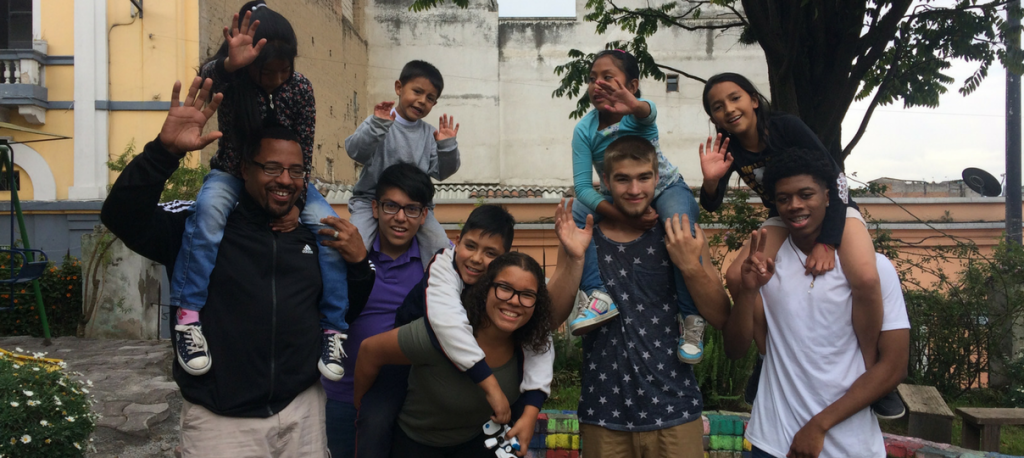This post, written by members Jacqueline Hesse and Christine McCartney, is the first of two parts.
After taking students from Global to Local, our global service-learning program out of Excelsior Academy in New York, to volunteer for ten days in Quito, Ecuador, this summer, we invited our students to share some of the journal entries they wrote while there. We used excerpts from five of the fifteen students who traveled with us to help us reflect on how this trip shaped us as educators and cemented our views on the importance of creating a global classroom. What follows are five realizations we want to hold onto and share.
- Young people find a sense of empowerment and fulfillment through helping others.
Here, Jason and Aboya reflect in their journals about volunteering with underserved youth in the capital city of Quito:
Jason: I was carrying a small boy named Justin. He was always moving, trying to avoid being tagged, almost falling off my shoulders trying to tag others while I was running away from others; and it was an enjoyable time. Although I was becoming tired as the time passed, with shoulder pain beginning to take over, we did not stop. No one mentioned how tired they were, only how happy the little ones were. My back and shoulders were aching afterward, but it didn’t matter. The important thing was that we were all enjoying this moment, playing with one another, and that the kids were laughing with happiness. They kept laughing, enjoying the time as much as possible.
Aboya: I think I’ve rediscovered the meaning, purpose, and enjoyment of giving back. I got so used to doing small actions that helped people at home that I never really felt like I did anything apart from what I was supposed to do. Being here at Casa Victoria was a choice and a privilege, and I actually get see the change I’m making through things like smiles on little kids’ faces. The tranquility and serenity I feel here away from my actual life is like a mental detox.
- Travel helps people exceed their own expectations.
Below, Taina shares an entry from her journal where she describes hiking Pichincha Mountain, where we wrote as we looked down at Quito and the surrounding valley.
Taina: Today had to be one of the most memorable days. I pushed myself to my physical limits and ended up hiking up to an elevated point of 14,000 feet. It was an amazing experience that was worth every minute. The views were absolutely stunning, and I had never seen anything like it in my life. I don’t think I’ve ever taken that many pictures in a span of 20 minutes. The more time we’re spending here the more I realize what a beautiful country Ecuador is and all the amazing things it has to offer.
- When young people travel to a foreign country, it shifts their perspective on home and the world.
The following excerpts were written after traveling to an isolated mountain village inhabited by Afro-Ecuadorians; here, students describe ways in which the experience challenged or shifted their ideas of themselves, others, and our places in the world.
Maribel: A lot of people take things for granted, like water and food. I saw that they had to get food from two other big families to feed all twenty of us. It was kind of sad because there were a lot of kids there who were very skinny. It made me worry about the families who lived there . . . what if, because they were helping to feed us, they didn’t have enough to feed their own families?
Aboya: So today when we were walking, I definitely enjoyed taking in all the beauty of Ecuador, but I also noticed all the not-so-nice things—the people out on the streets with soiled clothes, all the dogs running about the streets searching for food. Seeing that just does something to you. Makes you stop and reflect on life a little. I’m thankful for all the gracious opportunities afforded to me and everything that I have.
Addison: One of the elders I spoke with today said that he was grateful for us to come so [we would] see a different perspective on life and how other people live without using technology and how everything that they have is natural and how they work hard for what they have. We get distracted by things, by material things. We should enjoy playing outside, being in nature, without being inside playing on our phones all day.
- Travel builds empathy and challenges a single story that a young person might have in his or her mind about people who come from a different place or background.
Both Jason and Aboya found ways to relate to the people they met in Ecuador, despite any language or cultural barriers.
Jason: I was trying to put my mind into how they would think, how they would see the situation, how they would see us coming to them to play soccer, even though we didn’t know them. But at the same time, we both know how to play soccer, so I think that just automatically connected everybody.
Aboya: They’re really welcoming and open. That’s not the type of culture you see in America. You walk by someone and you ignore them. But [here] everyone you saw, they said hi, hola [. . .] so I felt the need to be happy, and reply [. . .] and it felt good, too.
- When students and teachers volunteer alongside one another, the student-teacher dynamic shifts.
Although we can’t help but feel grateful for how much our students learned from their experience, perhaps the most powerful idea that we want to keep with us comes from the experience of working and living communally with our students. We cooked, cleaned, washed dishes, ate, and wrote together. Breathless, we stood atop a mountain and looked down at the distance we had climbed. We practiced yoga on the lawn in the Andes Mountains. We sang on the bus and bartered in the market. Side by side, we built a learning center, after a crash course in how to lay bricks. We watched our students as they sat on the floor, teaching young children who had barely any access to technology to code robots and build simple electrical circuits in the after-school program. We felt the slow dissolution of the arbitrary barrier between teacher and student as we learned to see each other more completely as people, each with our own strengths, weaknesses, dreams, and goals.
Despite the extra hours we spent planning, fundraising, and organizing for this trip, there hasn’t been a single moment when we regretted it. In fact, seeing our students return from their travels ready to roll up their sleeves and take on community impact projects in our city, combined with hearing about their newfound love and appreciation for travel is motivating. When we envision the future of Global to Local, we know our next group of students will feel the same sense of growth, empowerment, empathy, and gratitude . . . and we cannot wait to get started.
Christine McCartney, NCTE member since 2013, started her teaching career by volunteering to teach writing in an all-male maximum security prison in New York through the Bard Prison Initiative; that experience was the beginning of her journey as a social justice educator. As a high school English teacher for over a decade in Newburgh, a Fulbright alumni, and a codirector of the Hudson Valley Writing Project, Christine is wedded to working to make her community a better place.

Jacqueline Hesse, NCTE member since 2005, teaches ninth- and tenth-grade ELA at Excelsior Academy, a New York State P-TECH school, in Newburgh. She enjoys volunteering alongside her students and admires their devotion to their community. Jackie is also a teacher consultant with the Hudson Valley Writing Project.



